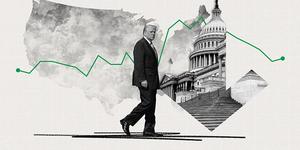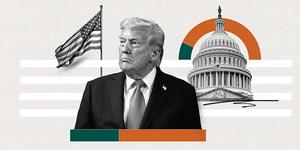USA
Explore Â鶹´«Ã½'s research.

Employee engagement has fallen from its 2020 peak, with sharp drops among younger workers as role clarity, feeling cared about and development erode.

Frequent use of AI in the workplace has continued to rise, while overall use has remained level. Use varies widely by industry, role type and job level.

Americans remain widely engaged in charity, with volunteering rising and participation increasingly centered on nonreligious rather than religious organizations.

A reduced majority of Americans view "big government" as most threatening to the future of the U.S., while a near record-high 37% say "big business" is.

A new high of 45% of U.S. adults identified as political independents in 2025.

Nurses still rank highest for ethics, yet Americans' ratings of most professions remain historically weak and declining.

Americans expect a difficult 2026, expressing pessimism about most economic, political and global matters — with the stock market a notable exception.

Eight decades of polling offers important lessons about the kinds of healthcare reforms Americans are willing to support.

Regular exercise is more closely linked to reduced stress among women than among men and peaks with at least six days of exercise per week.

In 1998, Americans imagined the year 2025 with advances in technology and medicine, while fearing more inequality, global conflict and environmental harm.

Four in 10 Americans say they are overweight, and 52% want to lose weight. Yet only half as many are trying, with women expressing more desire.

Americans usher out 2025 with low approval of their leaders, worsening economic views, and sharp partisan divides after the shutdown.

Most Americans still celebrate Christmas, but fewer observe it religiously, while secular customs remain highly popular.

Concerns about and dissatisfaction with healthcare costs in the U.S. underscore Americans' belief that the nation's healthcare system is highly flawed.

Americans' approval of the Affordable Care Act has risen to a new high, fueled by increased support among political independents.

Americans' economic confidence has fallen to its lowest level in over a year, accompanied by a historic drop in planned holiday spending.

Larger majorities than in 2011 say Republicans (69%) and Democrats (60%) go too far in using inflammatory language to criticize their opponents.

President Donald Trump's job approval rating has slipped to a new second-term low point and is approaching his all-time low of 34%.

Nearly one in 10 Americans have been diagnosed with cancer at some point in their lifetime, even as new incidences of cancer are slowly falling.

West Health and Â鶹´«Ã½ developed a system to rank all 50 states and D.C. based on residents' experiences with healthcare cost, quality and access.